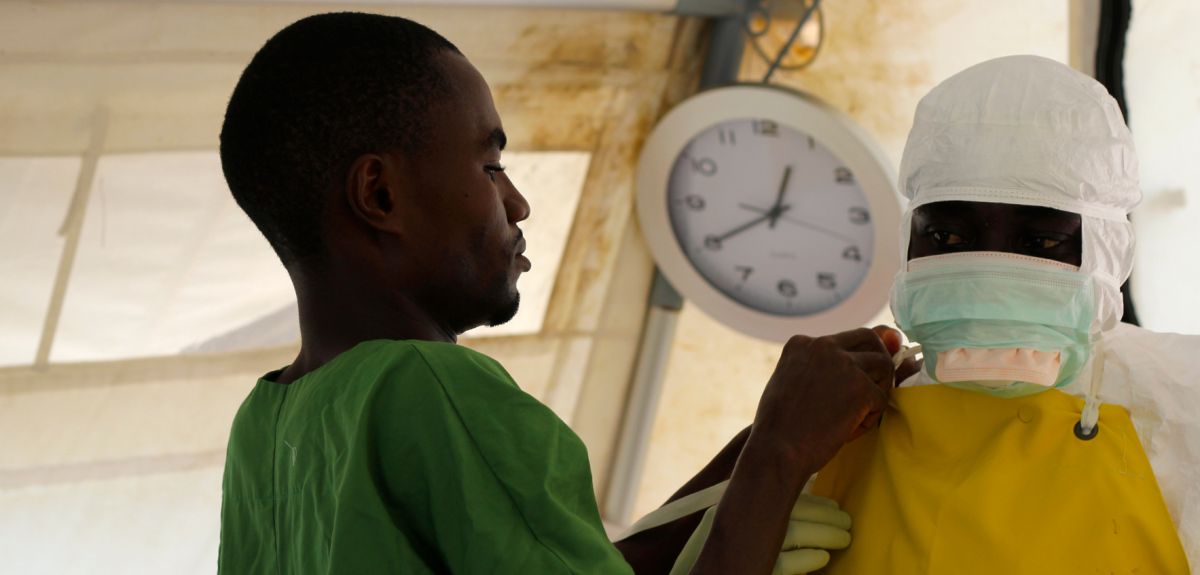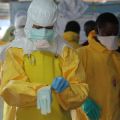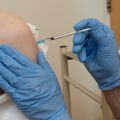
(c) CaitlinRyan/MSF
Trial of a potential treatment for Ebola begins in Liberia
A clinical trial of a potential treatment for Ebola has started in Liberia, with the first Ebola patient receiving the study drug on 2 January.
The trial is led by the University of Oxford and is taking place at Médecins Sans Frontières (MSF)’s ELWA 3 Ebola Management Centre in Monrovia.
Funded by the Wellcome Trust, the trial aims to evaluate the effectiveness of an oral antiviral drug called brincidofovir in patients with Ebola virus disease. Brincidofovir is an experimental drug made by the US company Chimerix in Durham, North Carolina.
Professor Peter Horby of Oxford University's Centre for Tropical Medicine and Global Health, and the trial's chief Investigator, says: 'I'm delighted that the trial has started. It is a tribute to the momentous efforts of the Liberian authorities, MSF, and all the staff working in ELWA3 that we have begun 2015 with real progress towards identifying new treatments for Ebola.
'We can only fully evaluate potential Ebola therapies during an epidemic, and we have shown that this is possible, even during the worst epidemic in living memory.'
Dr Francis Kateh, Deputy Manager for Medical Affairs of the Government of Liberia (GoL)'s EVD Incident Management Systems (IMS), says: 'Although Ebola has been in existence for over 30 years, this is the first time that it has brought the world to a reality check, hence it critical that proactivity be the key on how we address emerging diseases. Testing brincidofovir could help the world in finding a way to subdue this voracious disease and safe future generation. We are glad to serve as a catalyst in saving mankind.'
The trial is being carried out by an international team, including the University of Oxford, the International Severe Acute Respiratory and Emerging Infection Consortium (ISARIC), MSF and the Global Health Network.
Professor Trudie Lang, one of the investigators from Oxford University, says: 'There are currently no known treatments for Ebola, and so any drugs being given to patients have not been shown to work for Ebola. Giving them on a case by case basis does not enable us to learn whether or not the possible treatments work, therefore it is essential that we run a properly designed trial to be able to test these drugs and see if they are safe and do in fact work.'
She adds: 'Typically it takes over 18 months to start a trial. Here we have done it in less than four months. Everyone has pulled together to make it happen – a Herculean effort by all those involved.'
The drug brincidofovir was developed as a potential prevention or treatment for other viral diseases. While the novel antiviral has shown activity against the Ebola virus in test-tube studies in the lab, its effectiveness in patients with Ebola has not yet been evaluated. It is currently in advanced clinical trials for treating adenovirus and cytomegalovirus infections, providing a lot of data on its safety profile.
In the trial – a single-arm, open-label study with no control group – a two-week course of brincidofovir is being given to all patients in the ELWA3 centre in Monrovia consenting to take part. Up to 140 adults will be involved in the trial.
The main outcome measure is fatality rate among the Ebola patients taking part. This would be compared against the previous death rate seen among patients in the treatment centre before the trial began.
Taking part in the trial is completely voluntary. All new patients confirmed to be Ebola positive by blood test at the treatment centre in Monrovia will be informed about the trial and can decide whether they would like to participate or not. Those who do not wish to be given the new treatment will receive the same standard supportive care as those who do.
 Statins do not cause the majority of side effects listed in package leaflets
Statins do not cause the majority of side effects listed in package leaflets
 Activism proves a stimulating topic at Sheldonian Series event
Activism proves a stimulating topic at Sheldonian Series event
 New Oxford-led initiative launches to train future leaders in transformative technologies for pharmaceutical research
New Oxford-led initiative launches to train future leaders in transformative technologies for pharmaceutical research
 Oxford to lead trial of experimental drug in Ebola patients
Oxford to lead trial of experimental drug in Ebola patients
 Oxford Vaccine Group begins first trial of new Ebola vaccine
Oxford Vaccine Group begins first trial of new Ebola vaccine
 Booster Ebola vaccine enters first trials at Oxford University
Booster Ebola vaccine enters first trials at Oxford University